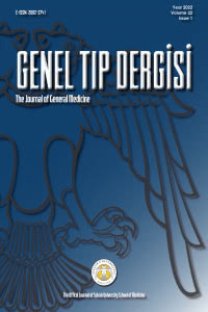Psöriasisde tamamlayıcı ve alternatif tıp yöntemleri kullanımı ve beslenmeyle olan ilişki: bir anket çalışması
___
NIH Consensus Conference.. Acupuncture. JAMA 198-98; 280, 1518–24.National Center for Complementary and Integrative Health. (2016a). Time to talk campaign. Retrieved from https://nccih.nih.gov/news/multimedia/gallery/asktell.htm.
National Center for Complementary and Integrative Health. (2016b). Complementary, alternative, or integrative health: What's in a name? Retrieved from https://nccih.nih. gov/health/integrative-health.
Karabudak Ö, Yıldız H: Kozmesötik ve Bitkisel Ekstreler. Türkiye Klinikleri J Cosm Dermatol-Special Topics 2012;5.
Wieland LS, Manheimer E, Berman BM. Development and classification of an operational definition of complementary and alternative medicine for the Cochrane collaboration. Altern Ther Health Med 2011;17:50-9.
Damevska K, França K, Lotti T, Nikolovska S. Complementary and integrative therapies for psoriasis: Looking forward. Dermatol Ther. 2018 Aug 22:e12627. doi: 10.1111/ dth.12627. [Epub ahead of print].
Bishop FL, Lewith GT. Who uses CAM? A narrative review of demographic characteristics and health factors associated with CAM use. Evidence-based Complementary and Alternative Medicine:e CAM 2010; 7: 11–28.
Straus SE. Herbal medicines--what's in the bottle? The New England Journal of Medicine 2002; 347: 1997–8.
Dastgheib L, Farahangiz S, Adelpour Z, Salehi A. The prevalence of complementary and alternative medicine use among dermatology outpatients in shiraz, Iran. Journal of Evidence-Based Integrative Medicine 2017; 22: 731–5.
França K, Jafferany M. Psoriasis. In K. França & M. Jafferany (Eds.), Stress and skin disorders (pp. 227–235). Heidelberg: Springer. (2017).
Özeren M, Altunay İK, Köşlü A. Psöriazis hastalarında alternatif tıp yöntemlerinin araştırılması. ŞEH tıp bülteni 38: 4-2004.
Gürer MA. Psoriasis giriş. Turkderm - Arch Turk Dermatol Venerology 2016;50(Suppl 1):2-3.
Alceylan LT, Şanlıer N. Psoriasis ve Beslenme İlişkisi. Turkish Journal of Dermatology 2015; 9: 81-5.
Ben-Arye E, Ziv M, Frenkel M, Lavi I, Rosenman D. Complementary medicine and psoriasis: Linking the patient's outlook with evidence-based medicine. Dermatology 2003; 207: 302–7.
Damevska K, Neloska L, Nikolovska S, Gocev G, Duma S. Complementary and alternative medicine use among patients with psoriasis. Dermatologic Therapy 2014; 27:281–3.
Gönül M, Gül Ü, Çakmak SK, Kılıç S. Unconventional medicine in dermatology out patients in Turkey. Int J Dermatol 2009;48:639-44.
Demirci GT, Altunay İ, Küçüknal A, Mertoğlu E, Sarıkaya S. Deri hastalıklarında tamamlayıcı ve alternatif tıbbi yöntem kullanımı ve hastalar üzerinde olumlu ve olumsuz etkileri, Turk J Dermatol 2012;6:150-4.
Kutlu S, Ekmekçi TR, Köşlü A, Purisa S. Dermatoloji Polikliniğine Başvuran Olgularda Tamamlayıcı ve Alternatif Tıp Yöntemlerinin Kullanımı. Turkiye Klinikleri J Med Sci 2009;29:1496-502.
Boneberger S, Rupec RA, Ruzicka T. Complementary therapy for atopic dermatitis and other allergic skin diseases: facts and controversies. Clin Dermatol 2010;28:57-61.
Kalaaji AN, Wahner-Roedler DL, Sood A. Use of complementary and alternative medicine by patients seen at the dermatology department of a tertiary care center. Complement Ther Clin Pract 2012;18:49-53.
Göker K, Yıldız H, Karabacak E, Doğan B. Dermatoloji polikliniğine başvuran hastaların tamamlayıcı ve alternatif tıp yöntemleri hakkında bilgi ve yaklaşımları. Turkderm - Arch Turk Dermatol Venerology 2015;49:285-90.
Chen YF, Chang JS. Complementary and alternative medicine use among patients at tending a hospital dermatology clinic in Taiwan. Int J Der matol 2003;42:616-21.
Baron SE, Goodwin RG, Nicolau N, Blackford S, Goulden V. Use of complementary medicine among out patients with dermatologic conditions within Yorkshire and South Wales,United Kingdom. J Am Acad Dermatol 2005;52:589-94.
Buchness MR. Alternative medicine and dermatology. Semin Cutan Med Surg 1998;17:284-90.
Cuellar N, Aycock T, Cahill B, Ford J. Complementary and Alternative Medicine(CAM) use by African American(AA) and Caucasian American(CA) older adults in a rural setting: a descriptive, comparative study. BMC Complementary and Alternative Medicine 2003; 3: 8.
Durusoy Ç, Güleç AT, Durukan E, Bakar C. Dermatoloji Polikliniğine Başvuran Akne Vulgaris ve Melasma Hastalarında Tamamlayıcı ve Alternatif Tıp Kullanımı: Anket Çalışması. Turk J Dermatol 2010;4:14-7.
Akyol AD, Yildirim Y, Toker E, Yavuz B. The use of complementary and alternative medicine among chronic renal failure patients. J Clin Nurs 2011;20:1035-43.
Eisenberg DM, Kessler RC, Van Rompay MI. Perceptions about complementary therapies relative to conventional therapies among adults who use both: results from a national survey. Ann Intern Med 2001;135:344-51.
Wolters M.The significance of diet and associated factors in psoriasis. Hautarzt, 2006. 57, 999–1004.
Millsop JW, Bhatia BK, Debbaneh M, Koo J, Liao W. Diet and psoriasis, part III: Role of nutritional supplements. Journal of the American Academy of Dermatology 2014; 71: 561–9.
Brazzelli V, Grasso V, Fornara L, Moggio E, Gamba G, Villani S, Borroni G. Homocysteine, vitamin B12 and folic acid levels in psoriatic patients and correlation with disease severity. Int J Immunopathol Pharmacol 2010; 23: 911–6.
Brown AC, Hairfield M, Richards DG, McMillin DL, et al. Medical nutrition therapy as a potential complementary treatment for psoriasis-five case reports. Altern Med Rev 2004; 9:297-307.
Johnson JA, Kanada KN, Armstrong AW. Diet and nutrition in psoriasis: analysis of the National Health and Nutrition Examination Survey (NHANES) in the United States. JEADV 2014;28:327-33.
- ISSN: 2602-3741
- Yayın Aralığı: 6
- Başlangıç: 1997
- Yayıncı: SELÇUK ÜNİVERSİTESİ > TIP FAKÜLTESİ
Madde kullanım bozukluğu olan gençlerin cinsel yolla bulaşan hastalık bilgi düzeyleri
Duygu AKÇAY, Bülent Devrim AKÇAY
ZEYNEP GİZEM KAYA İSLAMOĞLU, Abdullah DEMİRBAŞ, Gözde ULUTAŞ DEMİRBAŞ, Nihal SARİ, Emre ZEKEY
Sevcan UĞUR, Ayşegül KURTOĞLU, Bülent BÜTÜN
Miyofasiyal tetik noktaların sıklığı multiple skleroz hastalarında farklılık gösterir mi?
Dana kardiyak veninde bupivakainin etkileri: Endotelin rolü
Oğuz Raşit KARAKULAK, AYŞE SAİDE ŞAHİN
Renal transplant hastalarında influenza ve pnömokok aşı farkındalığı
İSKENDER KARA, FATMA YILDIRIM, Melda TÜRKOĞLU, ŞAHENDER GÜLBİN AYGENCEL BIKMAZ
Tip B kesintili arkus aorta: olgu sunumu
Zeliha FAZLIOĞULLARI, Nadire ÜNVER DOĞAN, Betül SEVİNDİK, Nusret SEHER, Ahmet KAĞAN KARABULUT
